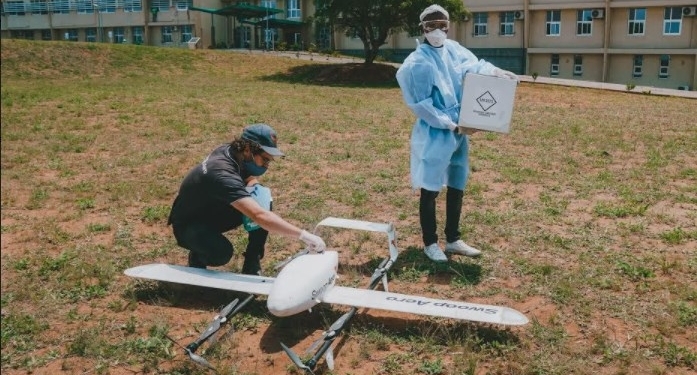Drones to bring Covid-19 vaccines in last-miles of Africa
Drones are becoming an important tool for African nations to move their Covid-19 vaccines for populations even in the remotest locations.

The world is in desperate need to vaccinate its human population against Covid-19 pandemic, so is Africa. However, the continent faces many logistics challenges due to the urgency and the huge volume by which it should be transported. Drones are becoming an important tool for African nations to move their Covid-19 vaccines for populations even in the remotest locations. Let’s take a look into what drone operators would like to say about it.
Africa has unique logistics challenges compared to other continents. Many people are not connected due to the proper infrastructure. Extreme weather conditions like floods worsen the accessibility of these areas. Other than these some countries have very difficult terrain that makes the movement of commodities extremely difficult.
However, countries across the African continent have some of the most sophisticated drone networks in the world as they have understood its importance. Drones will assist to reach these remote areas with ease since they are easy to deploy and do not require expensive infrastructure.
In the context of moving Covid-19 vaccines for the population in the continent, drones could be an extra advantage for most countries, particularly in the last mile.
Sabrina Ravail, commercial director, Swoop Aero, said, “As early adopters of air logistics, these countries are well placed to roll out the Covid-19 vaccine by air.”
As examples, she noted that Malawi established the world’s first humanitarian drone corridor in 2017 to prevent the rise of communicable diseases in highly fragile locales. The Democratic Republic of Congo established the first drone port in Central Africa to distribute vaccines for hard to reach communities in 2019.
As early adopters of these new technologies, African nations have recognised the importance and value of drones in the delivery and distribution of Covid-19 health supplies and imminent Covid-19 vaccine.
Sabrina Ravail, Swoop Aero
“African nations have recognised the importance and value of drones in the delivery and distribution of Covid-19 health supplies and imminent Covid-19 vaccine. The easily scalable solution, as prefaced on the lack of heavy on-ground infrastructure required to establish a network, has facilitated a fast, reliable, agile and safe method of health commodity transportation. For example, in Malawi, the deployment of the Swoop Aero air logistics service has reduced critical journey times from 90 minutes down to a 12-minute journey,” she added.
Spokesperson of Zipline, said, “Long-distance drone delivery can play a major role. Pre- existing healthcare access disparities and the complex handling requirements of the leading vaccine candidates pose daunting and unresolved challenges. Instant delivery of the Covid- 19 vaccine could help bridge that gap.”
Geoffrey Nyaga, chief operations officer, Astral Aerial Solutions, said, “Drones provide a faster means of transporting high value and critical goods like the Covid-19 vaccines. In remote locations within Africa that are inaccessible owing to poorly developed infrastructure, drones will enable timely access to ensure that the communities living in those areas receive vaccines.”
Challenges for flying drones with vaccines
Regulatory requirements are often cited as the greatest challenge in operating drones in Africa. This hasn’t changed even though the Covid-19 vaccines come with greater challenges like strict temp-control and limitations like the quantity drones could carry.
Cleopa Otieno, chief executive officer, Kenya Flying Labs, said, “The main challenges we see are around drone regulations in Africa. Very few African countries have a framework in place for the safe integration of drones into the airspace. This hinders development and use of technology. Training and certification have also been a challenge as well as access to drone technology.”
Spokesperson, Zipline, said, “Challenges faced include convincing the aviation authorities and getting approval for the system to work. These usually take from months to years, performing lots of demonstrations to convince them about the safety of the deliveries to the people, property and also the delivery package itself which in this case is the vaccines.”
Nyaga said, “Our biggest challenge is that this is a new technology that is being implemented for medical deliveries in the wake of the Covid-19 pandemic. This means that we have to get it right the first time. We are doing a lot of groundwork in planning and coordination among the different stakeholders involved ensuring that we get enough testing and validation of the delivery exercise, in preparation for the actual delivery.”
Drones geographies in Africa
One of the first countries to use drones for medical logistics in Africa was Rwanda. It is a hilly country with difficult geography. This has made the use of drones a viable business case as efficient health care is available to people in the remote regions of the country. Drone operators have to expand their operations to new countries and African nations have to improve the quality of regulatory requirements for help move Covid-19 vaccines in the continent.
Our biggest challenge is that this is a new technology that is being implemented for medical deliveries in the wake of the Covid-19 pandemic.
Geoffrey Nyaga, Astral Aerial Solutions
Nyaga said, “East Africa is a major player in medical drone deliveries. Drone operators like Zipline and Wingcopter in countries like Rwanda and Tanzania have made significant traction in drone applications for medical deliveries. Following the promulgation of Kenyan
UAS regulations, we are now gearing up for our very own flagship medical deliveries, which will pave the way for delivery of Covid-19 vaccines in the country. Across the rest of Africa, countries like Ghana and Cameroon are also making headway with medical delivery drones.”
Ravail said, “We have a growing presence in Africa with operations underway in the Democratic Republic of Congo, Malawi and Mozambique. When it comes to locations for potential new networks for vaccine delivery, new routes can be developed in-country based on demand, requirements and regulatory landscape.”
Temp-controlled drones
Logistics is already a major challenge for lifesaving supplies like blood, blood products and vaccines in Africa owing to infrastructural challenges. When the requirement for temperature control is added, it makes it almost impossible to deliver these supplies.
Nyaga said, “Fortunately, there are specially designed drone platforms for the transportation of temperature-controlled goods. Astral Aerial have partnered with a capable drone manufacturer for the delivery of these critical healthcare supplies regardless of whether they are temperature controlled or not. These drones have already been tested in other parts of the world and the Kenyan urban and rural setting is the next frontier.”
Ravail said, “Swoop Aero has extensive experience transporting dangerous goods and cold- chain samples within Africa, including Tuberculosis (TB) Sputum, oxytocin, anti-rabies vaccine, blood and HIV viral load samples, at high volume. To date, Swoop Aero has achieved 100 percent cold-chain compliance to health facilities; successfully transporting 14,015 doses of vaccines under cold chain conditions in the southern districts of Malawi.
Otieno said, “Temperature-controlled cargo boxes have previously been experimented with. However, this may reduce the weight of the vaccines that can be transported for a single flight.”
Infrastructure upgrade needed
Even though drones will not be solely responsible for the distribution of Covid-19 vaccines, the technological and infrastructural capabilities have to be upgraded towards unlocking the full potential of drones. The drone operators have to build a system consisting of temp- controlled storage hubs in partnerships with hospitals regulatory and security authorities.
Nyaga said, “The fact that the vaccines will be rolled out in phases will go a long way in developing and improving the effectiveness of the logistics system. It will also help in identifying areas that require technology improvements. These can then be implemented by strategic partnership over time.”
Ravail said, “Existing drone technologies can move a significant number of vaccines by integrating and strengthening the existing health supply chain. Further, drones logistics not only provide the short-term benefit of vaccine delivery but also the long-term benefit of a more robust and resilient health supply chain.”
Otieno said, “Drone technology is new in Africa as it is in many parts of the world, its true adjustments have to be made in terms of the local support structure for the technology to thrive, this is on issues around local manufacturing and assembly, local innovation around cargo boxes, training, certification and reskilling of drone pilots, repair and maintenance of drones. WeRobotics through the flying labs network is continuing to empower local operators in Africa to address some of these needs.”


